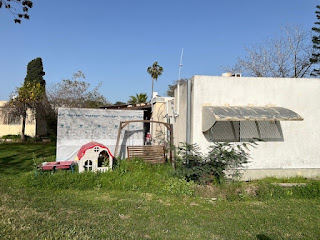In the morning and the evening Tel Aviv is still Golden.
The beach is busy with runners, bikers and surfers wading in the water for some of the world’s smallest waves. The sound of balls hitting rackets. But when you take a step closer and look at the faces or ask a question just below the surface you can see all is not well. Actually, nothing is well.
It was the end of Succoth. Throughout the Kibbutz the Succah still stands, paper rings garlanded from side to side, wind comes
through the bullet holes.
The hostage families worry the world is forgetting:
-- A man on dialysis has two sons in
captivity: “My kidney donors are in Gaza”
-- Another says, “how dare I eat soup
or take a nap when my kids haven’t or can’t.”
Another man spoke to his brother on the phone as the terrorist broke into his house: “This is the end,” the brother said.
Once he realized what was happening
a partygoer at the Nova festival called his mother to say: “The party is over.”
“This is not my personal story, it’s
our story,” a hostage relative said. “We are representative of the problem for
the world, the Jewish world.”
“Israel
was a shelter of the Jew, but not anymore.
We are at zero square and can’t do it alone.”
“Israel and America have the same goal,” another said. “We just do things differently because we are closer to the flame.”
“Trust in everything is challenged, except the future of the
state of Israel.”














